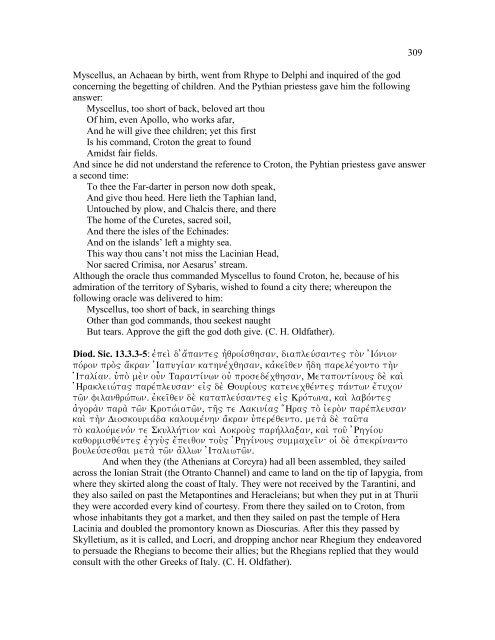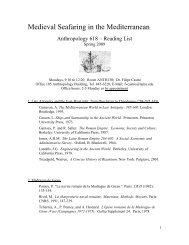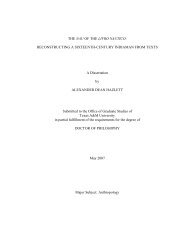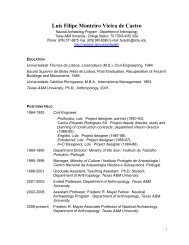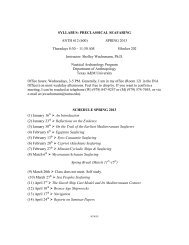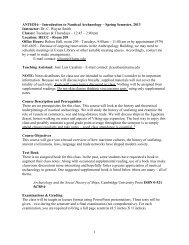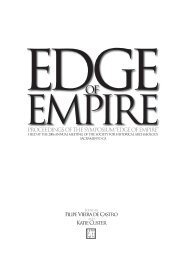Download Pdf of Dissertation - Nautical Archaeology at Texas A&M ...
Download Pdf of Dissertation - Nautical Archaeology at Texas A&M ...
Download Pdf of Dissertation - Nautical Archaeology at Texas A&M ...
You also want an ePaper? Increase the reach of your titles
YUMPU automatically turns print PDFs into web optimized ePapers that Google loves.
Myscellus, an Achaean by birth, went from Rhype to Delphi and inquired <strong>of</strong> the god<br />
concerning the begetting <strong>of</strong> children. And the Pythian priestess gave him the following<br />
answer:<br />
Myscellus, too short <strong>of</strong> back, beloved art thou<br />
Of him, even Apollo, who works afar,<br />
And he will give thee children; yet this first<br />
Is his command, Croton the gre<strong>at</strong> to found<br />
Amidst fair fields.<br />
And since he did not understand the reference to Croton, the Pyhtian priestess gave answer<br />
a second time:<br />
To thee the Far-darter in person now doth speak,<br />
And give thou heed. Here lieth the Taphian land,<br />
Untouched by plow, and Chalcis there, and there<br />
The home <strong>of</strong> the Curetes, sacred soil,<br />
And there the isles <strong>of</strong> the Echinades:<br />
And on the islands’ left a mighty sea.<br />
This way thou cans’t not miss the Lacinian Head,<br />
Nor sacred Crimisa, nor Aesarus’ stream.<br />
Although the oracle thus commanded Myscellus to found Croton, he, because <strong>of</strong> his<br />
admir<strong>at</strong>ion <strong>of</strong> the territory <strong>of</strong> Sybaris, wished to found a city there; whereupon the<br />
following oracle was delivered to him:<br />
Myscellus, too short <strong>of</strong> back, in searching things<br />
Other than god commands, thou seekest naught<br />
But tears. Approve the gift the god doth give. (C. H. Oldf<strong>at</strong>her).<br />
309<br />
Diod. Sic. 13.3.3-5: ejpei; d ja{pante" hjqroivsqhsan, diapleuvsante" to;n jIovnion<br />
povron pro;" a{kran jIapugivan k<strong>at</strong>hnevcqhsan, kajkei`qen h[dh parelevgonto th;n<br />
jItalivan. ujpo; me;n ou\n Tarantivnwn ouj prosedevcqhsan, Metapontivnou" de; kai;<br />
jHrakleiwvta" parevpleusan: eij" de; Qourivou" k<strong>at</strong>enecqevnte" pavntwn e[tucon<br />
tw`n filanqrwvpwn. ejkei`qen de; k<strong>at</strong>apleuvsante" eij" Krovtwna, kai; labovnte"<br />
ajgora;n para; tw`n Krotwvi<strong>at</strong>w`n, th`" te Lakiniva" {Hra" to; ijero;n parevpleusan<br />
kai; th;n Dioskouriavda kaloumevnhn a[kran ujperevqento. meta; de; tau`ta<br />
to; kalouvmenovn te Skullhvtion kai; Lokrou;" parhvllaxan, kai; tou` jRhgivou<br />
kaqormisqevnte" ejggu;" e[peiqon tou;" jRhgivnou" summacei`n: oij de; ajpekrivnanto<br />
bouleuvsesqai meta; tw`n a[llwn jItaliwtw`n.<br />
And when they (the Athenians <strong>at</strong> Corcyra) had all been assembled, they sailed<br />
across the Ionian Strait (the Otranto Channel) and came to land on the tip <strong>of</strong> Iapygia, from<br />
where they skirted along the coast <strong>of</strong> Italy. They were not received by the Tarantini, and<br />
they also sailed on past the Metapontines and Heracleians; but when they put in <strong>at</strong> Thurii<br />
they were accorded every kind <strong>of</strong> courtesy. From there they sailed on to Croton, from<br />
whose inhabitants they got a market, and then they sailed on past the temple <strong>of</strong> Hera<br />
Lacinia and doubled the promontory known as Dioscurias. After this they passed by<br />
Skylletium, as it is called, and Locri, and dropping anchor near Rhegium they endeavored<br />
to persuade the Rhegians to become their allies; but the Rhegians replied th<strong>at</strong> they would<br />
consult with the other Greeks <strong>of</strong> Italy. (C. H. Oldf<strong>at</strong>her).


